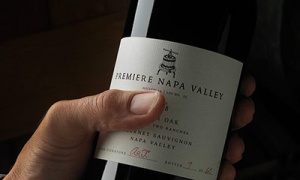Californian wine industry split over use of "Napa Valley" on wines made outside the state

Napa Valley winemakers are divided on the proposal to prevent winemakers from outside California being able to use Napa Valley American Viticultural Area (AVA) designation on wine sourced from the region.
Though wineries across the US regularly source grapes grown in Napa, the right for winemakers to label their wines Napa Valley wine may soon be restricted to California.
At present, wineries are able to source grapes from out of state vineyards, and use the names of the grapes’ AVA, as long as the wine is sold only in the state where it is produced.
"This loophole allows unscrupulous companies to deceive consumers," wrote Rep. Mike Thompson in a letter to the Alcohol and Tobacco Tax and Trade Bureau (TTB).
However, the proposed change has not garnered universal support. While supporters claim that closing this loophole will protect consumers, and uphold the integrity of the AVA system, critics argue that it actually disadvantages customers by removing relevant information.
“This regulation is really to protect Napa wineries producing Napa wine and not to protect the customer,” argued David Lecomte, chief winemaker at City Winery, a company that sources grapes from many out of state AVA’s and produces the vast majority of its wine at various urban locations, including New York and Chicago.
Some of its wines include a 2015 Chardonnay from Sonoma, a 2014 Pinot Noir from Mendocino and a 2013 “NYC Cab” from Napa Valley. Lecomte claimed that if the legislation is changed, his business would be forced to close.
“Selling an American wine without the capacity to name where it’s coming from. It’s not going to work. People want to know the vintage, the AVA and the vineyard.," he told the Napa Valley Register.
And concerns over the quality of wine labeled ‘Napa' is worrying some winemakers. Andy Beckstoffer of his eponymous winery in Napa Valley said: ‘There’s a culture here in Napa of quality, and I’m not sure that extends to Des Moines, Iowa.”
Jeffrey Maltzman who recently opened a winery in Colorado with the intention of selling California wine there said he could see both sides of the argument.
“I completely understand the desire of Napa Valley to preserve the name of Napa and eliminate wineries that are not supposed to be using the AVA,” he said. The fundamental flaw, he added, is that the rule actually results in the consumer receiving less rather than more information.
“As the owner of a winery in Colorado I don’t see why I shouldn’t be able to accurately and factually inform my customers.” Maltzman said that the new rule could reduce the price California grape growers receive for their crops, due to depressed demand.
However, Lecomte countered that while grape growers in lesser known AVA’s may suffer from lack of demand, “for the high end vineyards of Napa I don’t think it’s going to be changing.”
